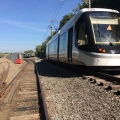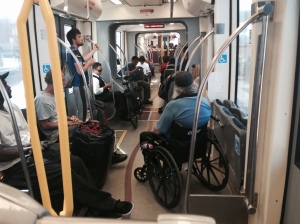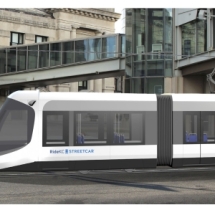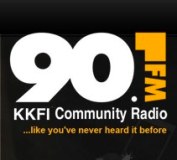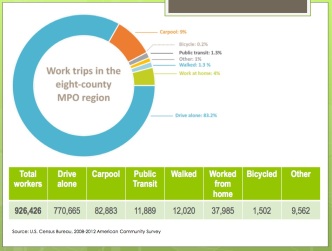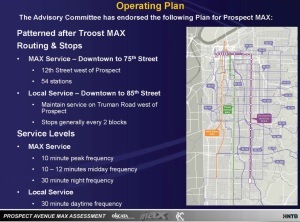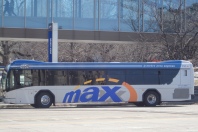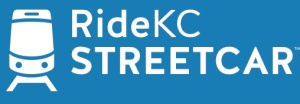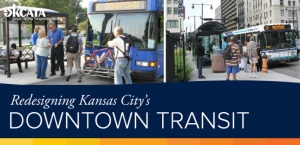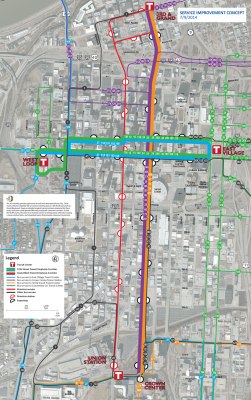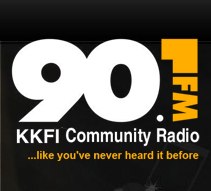
Why does the Kansas City region fail to qualify for significant federal dollars for most large rail projects, including going to the airport? Why can’t Kansas City pay for most big rail projects by itself? What should we do to change the situation?
A Dose of Reality: Challenges in paying for rail transit in the Kansas City region.
When: Tuesday October 14, 2014 @ 6 PM
Where: Transit Talk on RadioActive Magazine on 90.1 FM KKFI Kansas City Community Radio
Janet Rogers, co-founder of Transit Action Network talks with Mark McDowell, a specialist in Finance, a long-term transit advocate who works closely with Transit Action Network, and founding member and past Chair of the Kansas City Regional Transit Alliance, and Dick Jarrold, Vice-President of Regional Planning and Development at KCATA and former Regional Engineer for the Federal Transit Administration during the design and construction of the initial St. Louis MetroLink project.
Background:
Kansas City encounters two major areas of difficulty in paying for rail projects (NOT including voters reluctance to pass elections for funding these projects)
A. Qualifying for Federal matching dollars.
Most cities use federal dollars to help pay for very expensive rail projects.
New Starts –This grant program is the major source of federal funding for rail transit projects. The federal match for rail has shrunken from a norm of 80% down to 50% or less due to lack of federal funding and competition from numerous cities building and expanding rail systems.
- To qualify for funding, the program requires projects to receive at least an overall medium rating in the FTA evaluation process.
- According to Shawn Dykes, transit consultant with Parsons Brinckeroff, the most important number in the project justification analysis for federal funding is cost-effectiveness or annual cost per rider. The FTA is not funding any projects that don’t rate at least medium in Cost Effectiveness. Currently that requires an annual cost/rider number of less than $10 per rider (or trip).

Since costs for building streetcars (about $50 million per mile) or light rail (about $60-$70 million per mile) are relatively consistent around the country, the difference in cost-effectiveness for projects is mainly related to the ridership numbers.
Population Density– ridership numbers are strongly related to the population density around a proposed rail project. Lack of density in the whole city is immaterial – the evaluation is only concerned about the population within 1 mile of the proposed track.
- The Kansas City region has good population density in several transit corridors, such as: downtown corridor from River Market to the Plaza, along Independence Ave, 31st Street/Linwood, Prospect Ave, and State Avenue in KCK.
- There are no well-established high-density transit corridors in Eastern Jackson County or to the airport (No transit corridor has really even been developed to the airport). Therefore, studies show very poor ridership projections for these areas.
- Calculating projected ridership numbers starts with the current bus ridership in the transit corridor. Neither Eastern Jackson County nor any path to the airport has significant bus ridership to create a good base for rail ridership projections. Getting large ridership numbers between the airport and downtown depends on large numbers of daily riders, like commuters, not the occasional bump from 5 to 10 large conventions.
- Commuter rail from Eastern Jackson County into Kansas City or light rail to the airport do not qualify for the FTA medium rating for cost-effectiveness (cost/rider under $10) and therefore fail the first hurdle in receiving federal New Starts funding.
TIGER Grant– Kansas City has done very well receiving TIGER grants, another source of federal funding. However, they are limited to about $20 million dollars. This amount is great for small projects like the two-mile downtown streetcar, but it doesn’t have a significant impact on a billion dollar project like light rail to the airport.
B. Generating local revenue for rail projects
Rail projects are very expensive. Most cities can’t pay for large projects themselves and need a federal match. Small starter lines, like the Downtown Streetcar, are often paid for locally.
Kansas City has a very hard time getting any rail projects approved by voters. Even if the voters approve a rail project, Kansas City struggles to generate enough money to pay for the project.
Building a rail line is just like building a new house. You have to borrow the money and pay off a house mortgage or in the case of rail, pay off bonds.
You can only build a house that you can afford to pay off the monthly mortgage. If you only make $30,000 a year, you aren’t going to build a $400,000 house. You can’t afford the monthly/yearly payment.
Building rail has the same cash flow problem. The city borrows the money and issues bonds, then they have to be able to pay the yearly bond payments, usually though tax collections.
Revenue Capacity – Kansas City’s revenue generation is too low in many cases to meet the bond payments for large rail projects, even if the feds pay half the project cost. The streetcar expansion project required half the money from federal grants, yet the proposed Transportation Development District would not generate all of the money for the other half. If the proposal had passed, the city had to close the funding gap through other methods or shorten the routes.
What about paying for light rail to the airport? Kansas City definitely can’t pay for light rail to the airport at this point in time.
Light rail to the airport: 17 miles at the low-end of cost, $60 million per mile, is $1.020 billion – plus add the cost of upgrading or building a new bridge and yearly operating and maintenance costs. Depending on the terms of the bond issue the yearly bond payment may easily range from $70 million to $90 million.
A city-wide 3/8 percent sales tax, like the sum of the two ballot measures on the Nov 4 ballot, will only generate about $27 million annually. Kansas City can’t pay for light rail to the airport by itself and the route won’t qualify for New Starts federal funding at this point. The cost/rider number to the airport is way over $10 per person. (high cost/low ridership)
Using a TDD for local funding:
In a Transportation Development District, the people who benefit from the transit are the ones voting. The district is usually smaller than a city-wide vote so the tax rates will be significantly higher in order to generate enough money to pay for rail. This model was successful for the Downtown Streetcar.
A Step in the Right Direction:
In order to qualify for federal matching funds, we need to develop high-density, mixed use corridors with great bus service. In order to do so the City needs to highly incentivize projects in those corridors. Create great mixed use, higher density, transit corridors that attract people and business, then let them grow so that ridership will qualify for federal matching dollars and they will have the revenue density necessary to fund rail projects.
When there are large rail studies, petition initiatives or votes for rail projects, people need to ask about the FTA cost-effectiveness number and the overall rating for receiving federal New Starts funding. This is the first hurdle to getting significant federal matching funds. If the project won’t come close to even qualifying for New Starts funding, ask if we can we pay for it ourselves with sales and property taxes and then ask if we want to.
Our next RadioActive Magazine Transit Talk is November 18th at 6 pm on 90.1FM KKFI Kansas City Community Radio.
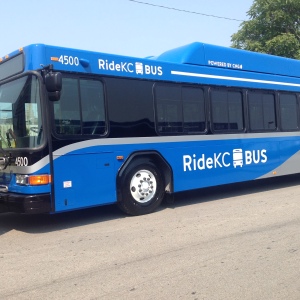 Transit Stakeholder Forums are few and far between so be sure to attend this one. Bring your ideas for additional projects to submit for federal funding through MARC.
Transit Stakeholder Forums are few and far between so be sure to attend this one. Bring your ideas for additional projects to submit for federal funding through MARC.


